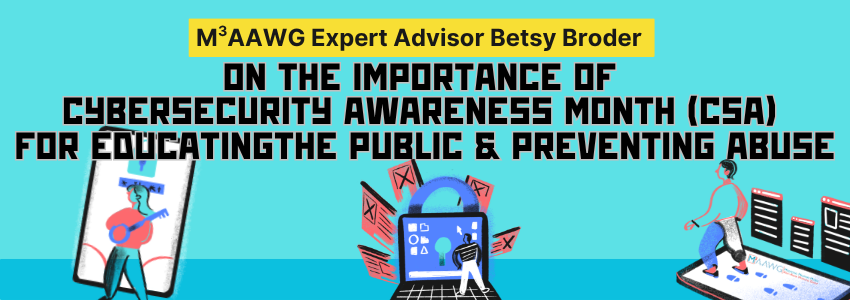
As a consumer protection professional with world-class expertise and decades of public service at the U.S. Federal Trade Commission (FTC), M3AAWG Expert Advisor Betsy Broder has seen firsthand the consequences of a lack of public awareness in preventing online abuse and fraud.
As mentioned previously in this blog, October is Cybersecurity Awareness Month (CSA), and M3AAWG proudly supports this initiative as an official Champion in 2025.
With many sources of catastrophic abuse and fraud stemming from human error, Betsy sat down with us to explore why this awareness month is so important and the ripple effect it can have in reducing the impact of abuse. Here is our interview with Betsy:
In your experience, what role do education and awareness play in preventing cyber scams?
There is no single way to prevent consumers from falling victim to cyber-enabled scams. If there were a simple, universal message, we would have neutralized these threats long ago. That’s why we should take advantage of every opportunity to promote consumer awareness, which is always a first line of defense.
But that alone is not enough. Consumer awareness is just one element in what needs to be a comprehensive approach that combines technological fixes and law enforcement efforts to shut down scams and deter would-be fraudsters from exploiting consumers.
Can you tell us about the three-part approach for protecting online users?
Here's an example of how it can work: The Stir/Shaken caller ID authentication protocol makes it harder to mimic trusted institutions like banks or government agencies. This has had an impressive impact on reducing spoofed numbers and robocalls, but nothing is foolproof, and that’s why financial institutions continue to stress to their customers that they should never share their password, account numbers, or other sensitive information to a caller, even if it appears to come from a trusted source.
The same message is echoed by the FTC and Federal Communications Commission (FCC). Additionally, criminal cases against call centers that use robocalls and spoofing continue both in the United States and abroad. This three-part approach leverages all available tools to protect consumers from these cyber-enabled scams.
Is there a particular incident from your career that could have been prevented if the victim had been more informed about cyber risks, social engineering tactics, and similar threats?
Unfortunately, even savvy consumers can be tricked into sending money or giving away their password information. This often happens when we let down our guard or when the urgency of the situation leads us to make a hasty and regrettable decision that, in hindsight, was unwise.
We all know about the grandparent scam, where just the right amount of information causes the call recipient to panic and do whatever they can to protect their purported loved one. Most people who have fallen for this trap realize that, if they had paused for a moment to check the facts or ask a question only the purported grandchild would know, they could have avoided the financial and emotional fallout.
Did your work at the FTC influence how you feel about the importance of consumer cybersecurity awareness campaigns?
Here's the thing: messages must be non-technical, consistent, and tailored to the audience to meet people where they are. The messaging for teens will differ from that for seniors. We can all learn from the effective communication tactics used by advertisers, which include efforts to be punchy and memorable while never talking down to the audience.
In addition, we should focus not only on how to avoid a scam but also on what to do after realizing you've been scammed. Contact the relevant institutions where the accounts may have been compromised, reach out to your local law enforcement, and share the details of your experience with the FTC at reportfraud@ftc.gov.
This year’s CSA theme is “Stay Safe Online” and as leaders of this campaign, the National Cybersecurity Alliance and Cybersecurity and Infrastructure Security Agency have created a free toolkit for engaging your own organization and community



